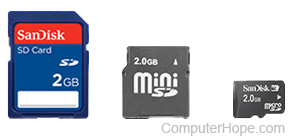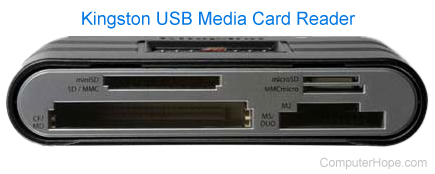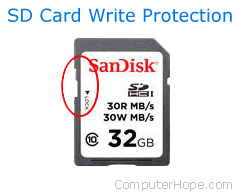Why is my SD Card not working or cannot be read?

SD cards are a great for storage of digital media, like photos or video clips in digital cameras, camcorders, MP3 players, and phones. Below are some reasons these cards may not work with a computer.
Test the SD card
If the SD card works with your device (e.g., can see pictures on the camera) but doesn't work with your computer, it's safe to assume the computer card reader has problems. A temporary workaround would be to connect the camera, phone, or another device to the computer using a USB cable with the SD card in the device. Once connected, you can transfer the data from the device to the computer without using the SD card in your computer. Skip to checking the USB adapters to start troubleshooting and finding a more permanent solution.
If the SD card does not work with your device (e.g., camera) and isn't recognized by your computer, the SD card may be bad. Skip to check write-protection to start troubleshooting SD card related issues.
If your smartphone cannot read an SD card, the card may have been formatted by a device that's incompatible with your phone's operating system. If you're experiencing this problem, visit your phone manufacturer's website for support.
Built-in memory card reader
Some laptop computers and desktop computers have a built-in memory card reader. The memory card reader may not be working properly and causing it to not read the memory card.
If you have another memory card, insert it into the computer reader to see if it can be read. If it can be read, your memory card is bad and likely needs to be replaced. If the other memory card is also not readable by the built-in memory card reader, it is a string possibility the memory card reader is not working. You would need to have an authorized service center look at and repair or replace the memory card reader in your computer. You can also try using an external USB memory card reader instead.
Checking the USB adapters

If you are trying to access the SD card using a USB card reader that connects to a USB port on the computer, try the suggestions below.
Use back USB ports
If you have a computer with front and back USB ports and the reader connects to the front ports, try using the back USB ports.
Disconnect and reconnect USB cable
Make sure the USB connector is securely attached to the USB port. You can verify its connection by disconnecting the USB connector and re-connecting it to the USB port.
Also, make sure the USB connector is securely connected to card reader as well. If this connection is loose, it can cause the card reader not to work properly or at all.
Disconnect and restart computer
Disconnect the USB connector, restart the computer, and then re-connect the USB connector to the USB port. Sometimes this resets the connection and allows the device to work properly again and read the SD card.
Install available drivers
Some USB card readers may have drivers available on the manufacturer's website. In most cases, Windows does automatically detect and install standard drivers, but some card readers may work better with drivers designed specifically for that device.
Test different types of digital media card
If your USB card reader can read types of digital media cards, try reading a different card to test the reader. If more than one card cannot be read, then the USB card reader may be defective and unable to read SD cards.
Press the card in a little harder
With some card readers, the SD card may have to be pressed in a little harder. Do not force the SD card into the slot, but try pressing in a little more than you normally would to make sure it is firmly inserted into the slot.
No drive icon in my computer
After inserting the SD card into your card reader, if there's no drive letter in My Computer to access the SD card, the computer may be low on virtual memory. To resolve this issue, close all open programs and allow your computer to idle for a few minutes. Plug in the SD card again and see if the drive letter appears.
Also, if your computer has Windows Vista, you may need to download and install a patch to fix a known bug relating to issues with reading SD cards in Windows Vista.
Check write-protection

Many SD cards have a feature called write-protection toggled on and off by a switch on the left side of the SD card. With write-protection enabled, files cannot be modified.
If your SD card has a write-protection switch, make sure it's disabled, or in the opposite direction that points to "LOCK" on the card. Then you can try using the SD card again and see if this fixes the issue.
Formatting
With some card readers, the card is formatted much like how a disk drive is formatted when first used in a computer. Sometimes, the device may format the SD card in a way that makes it only readable by that device and nothing else.
If you have trouble getting an SD card to work with your smartphone, the card may be formatted in a format your smartphone doesn't support.
If both the device (e.g., camera) and computer can read the SD card, the computer can access the media regardless of how it is formatted.
A potential fix would be to format the SD card to make the card readable again, but realize that this erases the card. Formatting should be done as a last attempt at getting the card to work.
Replacement
If the above solutions do not work for you, it may be necessary to purchase a new SD card as a replacement. Like any storage media, SD cards fail over time, depending on how much use it gets and where it is used. Extensive use or harsher environments (extreme temperatures or humid climate) can result in SD card failure.
